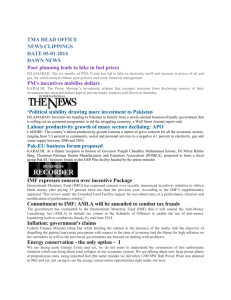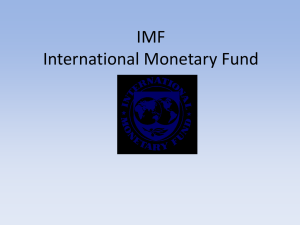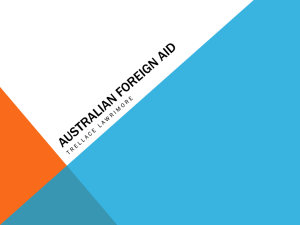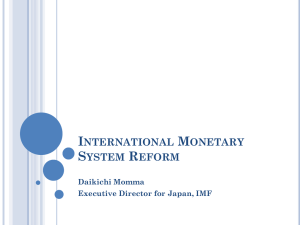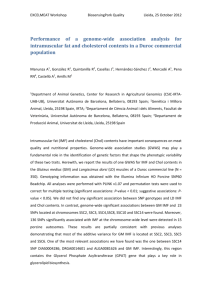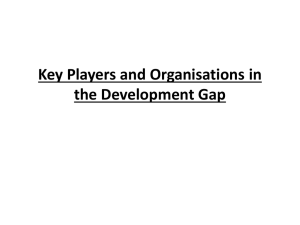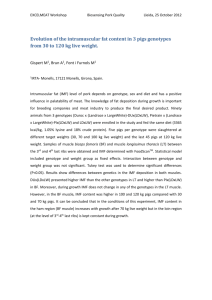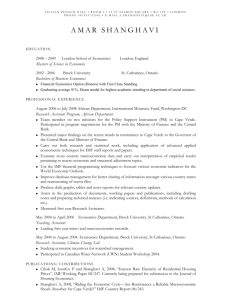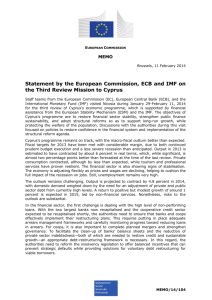income.doc
advertisement
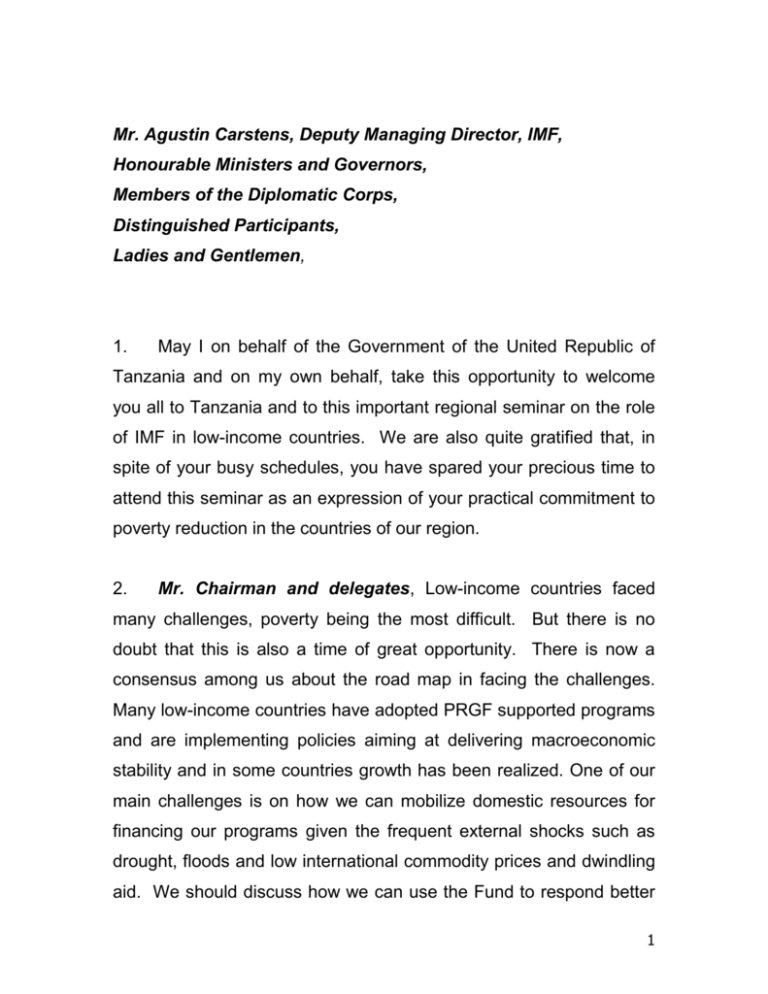
Mr. Agustin Carstens, Deputy Managing Director, IMF, Honourable Ministers and Governors, Members of the Diplomatic Corps, Distinguished Participants, Ladies and Gentlemen, 1. May I on behalf of the Government of the United Republic of Tanzania and on my own behalf, take this opportunity to welcome you all to Tanzania and to this important regional seminar on the role of IMF in low-income countries. We are also quite gratified that, in spite of your busy schedules, you have spared your precious time to attend this seminar as an expression of your practical commitment to poverty reduction in the countries of our region. 2. Mr. Chairman and delegates, Low-income countries faced many challenges, poverty being the most difficult. But there is no doubt that this is also a time of great opportunity. There is now a consensus among us about the road map in facing the challenges. Many low-income countries have adopted PRGF supported programs and are implementing policies aiming at delivering macroeconomic stability and in some countries growth has been realized. One of our main challenges is on how we can mobilize domestic resources for financing our programs given the frequent external shocks such as drought, floods and low international commodity prices and dwindling aid. We should discuss how we can use the Fund to respond better 1 to the real needs of our countries and to help achieve the high and sustained growth needed to reduce poverty and make decisive progress towards the Millennium Development Goals. The Fund should continue in the medium term to be a valuable supporting institution to address the low-income countries’ own development agenda in the context of a more challenging global set up. Low-income countries are voluntary members of the IMF. As members, we have benefited from services of the fund in many ways and over many years. I believe, we are satisfied with this relationship generally, otherwise we would not remain as members. Perhaps we may have problems and ideas which could help in improving whatever may be our status quo, or future relationship with and expectations from the IMF. This is why, we are here today. I suggest that we take this opportunity to inform the IMF, represented today by its Deputy Managing Director, Agustin Carstens and his other senior colleagues, about what we think they can do for us tomorrow; in the medium term. We can do a good job at it, by speaking from grassroot experience, not from ideological stances; from an analysis of the problems we face today as a stepping stone to solving them tomorrow, not by pointing fingers or finding fault. At this juncture, I must congratulate the IMF for mooting the idea of this meeting and for sending such a high powered delegation to listen to us. Welcome Mr. Casterns and please open your ears! 2 3. Mr. Chairman and delegates, most of the countries represented here today are the regional Highly Indebted Poor Countries (HIPC). Others, like Kenya or Zimbabwe, have passed this classification, but do in reality still have very many poor people, among their populations. They have a contribution to make for this seminar seen from their specific experiences and realities. One of the issues which we can not neglect is the role of our governments in managing our economies and creating conditions necessary for overcoming our poverty. All of us recognize the presence of abject poverty in our countries and are very eager to get rid of such a status. We know that even in Africa some countries are richer than others; that in Asia some countries which became independent at about the same time with us are today far richer than ours. In both cases the IMF was involved as advisor or donor in one form or another. We are not certain whether these countries did better because of or in spite of the IMF. Some people say both, some say none, some say either. Perhaps we will hear more about this from Mr. Casterns. We too, have something to say from our own experiences. Mr. Chairman and delegates, whatever the situation, we can safely say that successive governments and regimes in emerging market economies have had the following characteristics in their recent histories: Strong political leadership, democratic governances as defined by the local people themselves, strong national cohesion and consensus on major issues, strong macroeconomic balances, strong export oriented, sustainable economic growth trends, and limited or harmless interference by foreign governments and agencies in their 3 internal affairs. While the IMF can be cited as one of the influential external agencies in the South and South East Asian countries, the same may not be so true of countries such as China. There, the role of the Community Party and Government in directing the economy continues to be paramount, and is today one of the fastest growing by world standards. characterized It can also be said that, the Asian tigers were by strong governments practicing homemade democracy. Is it possible to say that in Africa the IMF weakened governments by undue pressures directed at our governments to get them fulfill conditionalities which were perhaps ill-timed or irrelevant or misconceived and therefore harmful? When we dismantled our parastatals in a swoop by selling them lock stock and barrel, did we not at the same time lose political power or our economic source of budgetary support through lost dividends? Did we not in the process create more unemployment and loss of skills created through past public training of our people? Did we by privatization and liberalization of trade not weaken our cooperatives and the democratic governance that was their way of life? Did we not expose our export crop producers to the manipulation of clever businessmen, local and foreign who offered lower commodity prices ………………………………………… thus exacerbating rural poverty? When we embraced globalisation, did we not do harm to our farmers who due to opened up markets, WTO style found themselves unable to compete with rich farmers in Europe and America who enjoy subsidies and higher prices? Don’t our farmers now earn less and less from their exports in spite of WTO? Are their incomes not lower 4 and poverty higher than before WTO? If the benefits of globalisation are as is the argument indisputable, is it not possible for the IMF and other international economic agencies to help the WTO, the developed countries and world business communities generally to be more considerate so that the poor share the cake equally or substantially? We are aware that, in all our countries the destruction of the environment is progressing at an alarming rate and that its poverty outcomes are frightening. Governments have the responsibility to stop this form of rape. But the crisis is now so immense that willing governments need more advice and money to stop further destruction and thus more impoverisation. If those who are doing more harm to the environment can dilly-dally or be left to get away with murder, such as when it comes to signing international treaties on environmental issues, can the IMF sit back with their hands folded? Can they not even intellectually arm or finance the poor to enable them to attend important international forum with which to make noices or protests such as happened in Mexico last year on trade? Mr. Chairman and delegated, we all know that, regardless of whether or not we are HIPCs or post HIPCs, the reforms we are undertaking are yet to be comfortably felt at grassroot level, with notable exceptions such as in universal primary education and rural roads. Even in those areas which show clear successes, problems still remain, such as inadequate physical and academic facilities. In 5 areas where cost sharing is being practiced, such as in water supply, and health care, there are serious shortcomings, arising mainly from inability for the poorest to afford current minimalist rates. At the same time our budgets are unable to further subsidise the poor, in spite even of budgetary donor support to a limited extent. Achieving higher economic growth rates through increased investments, local and foreign in strategic sectors is often cited as a sure way to combat unemployment and poverty in our countries. It is also an important way of achieving peace and controlling crime. The IMF could perhaps take initiatives to operationalise these ideas over a sustained period and on a country by country by country basis. It is important to address the question of creating a local middle class to act as a market, a better tax base, and cushion against social and political unrest arising from the gap which is an inevitable outcome of the directions our economies are headed for as a consequence of the current measures which we are taking in partnership with the IMF and others. Mr. Chairman and delegates,, I would now like to share with you some thoughts about how low income countries can best address poverty in the long run, challenges facing the region and opportunities in developing countries like ours. Let me also attempt to outline how the IMF can help us to eradicate poverty and to accelerate growth and raise living standards of our people. 6 The Challenges before us are many, but I would like to pose the following and suggest that you ponder over them during the seminar: First, how should the Fund further support our remaining reform agenda to accelerate poverty reduction and achieve the MDGs. Second, how can the Fund work with the broader international community in order to make substantive progress in multilateral trade negotiations in the context of the Doha Round, after the disappointing outcome at Cancun. As I believe you will agree with me, the unfair international trade system is today probably the biggest hurdle in the road to prosperity for most developing countries. We in low-income countries would continue to enhance cooperation and seize the opportunity provided by the IMF to further enhance our growth prospects and poverty reduction through sound economic policies and good governance. We have been receiving support from the IMF under the framework of enhanced consultations. The IMF has been re-engineering its approach to the management of policy changes in our countries for the past many years. The consultation process has worked well in some countries while in other countries has delayed policy reforms and programs implementation due to cumbersome procedures and benchmarks to be met. Based on past experience, there is a need to review the practice so as to make the process less burdensome to us. The idea is to have minimum conditionality that would enable us timely access to resources from 7 the Fund to address structural constraints and meet the MDGs. It is also important for the Fund to appreciate the technical capacity that exists in our countries in terms of analysis and policy formulation. Issues in the program design specific for low-income member countries and incorporating the lessons and experience for effective program design and Fund financing in the future. As you will note, most of our countries are about graduating from post HIPC PRGF. The issue then is what follows next. The low-income countries faces may challenges, but there is no doubt that this is also a time to great opportunity. There is now a consensus among us about the road map in facing the challenge. May low-income countries have adopted PRGF supported programs and are implementing policies aiming at delivering stability macroeconomic and in same countries growth has been realized. Mr. Chairman and delegates, our being here today is a result of the good effort and preparations by the IMF which organized and financed this seminar. I would like at the outset to pay special tribute to them as well as the Governments of Sweden and the United Kingdom as co-sponsors. I thank you all for your attention. 8
